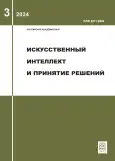Notional Model of Knowledge
- Authors: Vykhovanets V.S.1
-
Affiliations:
- N. E. Bauman Moscow State Technical University
- Issue: No 3 (2024)
- Pages: 18-31
- Section: Knowledge Representation
- URL: https://journal-vniispk.ru/2071-8594/article/view/265356
- DOI: https://doi.org/10.14357/20718594240302
- EDN: https://elibrary.ru/GYJYJF
- ID: 265356
Cite item
Full Text
Abstract
The article discusses the well-known methods of knowledge representation and processing. A new model, called notional, is proposed, characterized in that the relations (links) between notions are considered as ordinary notions. The notion is considered as a form of thought expressed by a named set of entities. A concrete notion identifies one entity. An abstract notion is formed from other notions by generalization (union) and association (Cartesian product) them. Declarative knowledge is given by enumerable sets of entities, and procedural knowledge is given by solvable ones, where resolving procedures are expressed by formulas of the pure monadic predicate calculus. The description of the applied language of knowledge representation and processing is given. It is proved that queries to the notional model are executed in polynomial time from the logarithm of the average number of entities in notions. The possibility of unsupervised learning notional models is substantiated. It is shown that the notional model makes it possible to visually represent and effectively process both declarative and procedural knowledge.
About the authors
Valery S. Vykhovanets
N. E. Bauman Moscow State Technical University
Author for correspondence.
Email: valery@vykhovanets.ru
Doctor of Technical Sciences, Associate Professor, Professor
Russian Federation, MoscowReferences
- Handbook of Knowledge Representation. Eds. Harmelen F., Lifschitz V., Porter B. Elsevier, 2008. 1031 p.
- Chein M., Mugnier M.-L. Graph-based Knowledge Representation: Computational Foundations of Conceptual Graphs. Springer, 2009. 425 p.
- Gough B., Madill А. Subjectivity in Psychological Science: from Problem to Prospect // Psychological Methods. 2012. V. 17(3). P. 374-384.
- Polya G. Mathematics and Plausible Reasoning. V. II: Patterns of Plausible Inference. Princeton, New Jersey: Princeton University Press, 1954. 464 p.
- Walton D. Abductive Reasoning. Tuscaloosa: The University of Alabama Press, 2005. 320 p.
- Brachman R. J., Levesque Y.J. Knowledge Representation and Reasoning. Elsevier, 2014. 413 p.
- The description Logic Handbook: Theory, Implementation and Applications. Eds. F. Baader, D. Calvanese, D. L. McGuinness, et al. New York: Cambridge University Press, 2003. 573 p.
- Klahr D., Langley P., Neches R. Production System Models of Learning and Development. Cambridge: The MIT Press, 1987. 466 p.
- Sowa J.F. Knowledge Representation: Logical, Philosophical, and Computational Foundations. Thomson Learning, 2000. 610 p.
- Object-oriented Design Knowledge: Principles, Heuristics, and Best Practices. Eds. J. Garzas, M. Piattini. Idea Group Publishing, 2007. 376 p.
- Gardarin G., Valduriez P. Relational databases and knowledge bases. Addison-Wesley, 1989. 448 p.
- Vykhovanets V.S. The Notional Model of Knowledge Representation // 13th Multiconference on Control Problems (MCCP). Journal of Physics: Conference Series. 2021. 1864 012058.
- The Oxford Dictionary of Current English. Ed. D. Thompson. New York, NY: Oxford University Press, 1999. 996 p.
- Olive A. Conceptual Modeling of Information Systems. New York, NY: Springer, 2007. 471 p.
- Russell S. J., Norvig P. Artificial Intelligence: A Modern Approach. Hoboken: Pearson, 2022. 1167 p.
- Vykhovanets V. S. O sushchestvennoj nepolnote formal'nogo metoda [On the essential incompleteness of the formal method] // Filosofiya, matematika, lingvistika: aspekty vzaimodejstviya. Materialy Mezhdunarodnoj nauchnoj konferencii [International Interdisciplinary Conference «Philosophy, Mathematics, Linguistics: Aspects of Interaction»]. SPb: Mezhdunarodnyj matematicheskij institut im. L. Ejlera [St. Petersburg: Euler International Mathematical Institute], 2009. P. 234-240.
- Vykhovanets V.S. Intelligent Information Systems based on Notional Models without Relationships // Z. Hu et al. (Eds.): CSDEIS 2020. Advances in Intelligent Systems, Computer Science and Digital Economics II, AISC 1402, p. 20–28, 2021.
- Vykhovanets V.S. Ponyatijnyj analiz i ponyatijnoe modelirovanie [The notional analisys and notional modelling] // Upravlenie bol'shimi sistemami [LargeScale Systems Control]. Issue 92. Moscow: IPU RAN, 2021. P. 64-109.
- Mendelson E. Introduction to Mathematical Logic. New York, NY: CRC Press, 2010. 496 p.
- Elmasri R., Navathe S. B. Fundamentals of Database Systems. Hoboken, NJ: Pearson, 2016. 413 p.
- Vykhovanets V.S. The Knowledge Description Language // 14th International Conference Management of large-scale system development (MLSD). Moscow, 2021. P. 1-5.
- Reghizzi S. C., Breveglieri L., Morzenti A. Formal Languages and Compilation. Springer, 2019. 499 p.
- Vykhovanets V.S. Metodika ponyatijnogo analiza slozhnyh predmetnyh oblastej [The methodology of notional analysis of complex subject domains] // Naukoemkie tekhnologii [Journal Science Intensive Technologies]. 2022. V. 23. No 8. P. 60−68.
Supplementary files








